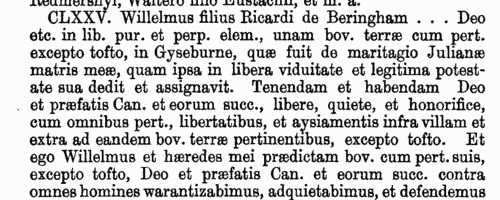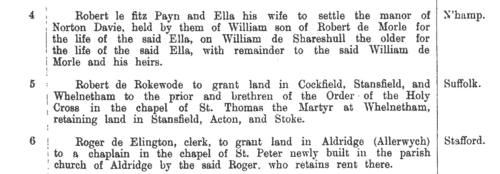Bygoth Surname Ancestry ResultsOur indexes 1000-1999 include entries for the spelling 'bygoth'. In the period you have requested, we have the following 4 records (displaying 1 to 4):
Buy all | |
| Get all 4 records to view, to save and print for £16.00 |
These sample scans are from the original record. You will get scans of the full pages or articles where the surname you searched for has been found.
Your web browser may prevent the sample windows from opening; in this case please change your browser settings to allow pop-up windows from this site.
Guisborough Cartulary
(1119-1300)
The Augustinian (black canons) priory of the Blessed Virgin Mary at Guisborough (Gyseburne) near Middlesbrough in north Yorkshire, was founded about 1119 by Robert de Brus. The 1100 or so grants of land (mostly in Cleveland) made to the priory from then well into the 13th century were copied into a cartulary or chartulary which survives as Cottonian Manuscript Cleopatra d ii (British Library). This was edited by W. Brown and published by the Surtees Society from 1889. This first part contains the charters from folios 1 to 233, items I to DXCIII. The texts have been stripped of repetitious legal formulae, retaining the details of the grantors, the property, and the witnesses: so the individuals named are mainly local landowners and tenants, canons, servants and wellwishers of the monastery. The charters before 1250 are often undated.BYGOTH. Cost: £4.00.  | Sample scan, click to enlarge

|
Grantees of offices, commissions and pardons
(1350-1354)
The Patent Rolls are the Chancery enrolments of royal letters patent. Those for the 24th to the 27th years of the reign of king Edward III (25 January 1350 to 24 January 1354) were edited for the Public Record Office by R. F. Isaacson, and published in 1907. The main contents are royal commissions and grants; ratifications of ecclesiastical estates; writs of aid to royal servants and purveyors; and pardons. BYGOTH. Cost: £2.00.  | Sample scan, click to enlarge

|
Inhabitants of Cambridge
(1298-1389)
'Cambridge Gild Records' was edited by Mary Bateson for the Cambridge Antiquarian Society, and printed in 1903. Several important records for the town are brought together: minutes of the Gild of St Mary in the church of St Mary in the Market Place, 1298-1319 (pages 1-13); bede rolls of the same of around 1349 (14-25); minutes of the Gild of Corpus Christi in the church of St Bene't (26-62); returns for all the Cambridge gilds in 1389 (63-128); a calendar of deeds connected with the gilds of St Mary and Corpus Christi (129-150); and also a subsidy roll for the borough, listing householders in the 8th year of king Edward II (1314-1315) (151-157). The gild minutes include lists of persons entering the gild, usually paying a certain amount for alms and for wax for lights (candles). The bede rolls list prayers for the souls of the deceased, using the formula 'pro anima ..... (et ..... uxoris ejus)', 'for the soul of ..... (and of ..... his wife)'. Dates are not generally given, but most of the entries in these bede rolls are from 1349 to 1352. BYGOTH. Cost: £4.00.  | Sample scan, click to enlarge

|
Landowners and tenants in Norfolk
(1345-1485)
Inquisitions ad quod damnum were held by the appropriate sheriff or escheator (or other officer in whose bailiwick the matter in question might lie) to investigate cases in which the royal or public interest might be damaged by proposed alienation or settlement of land (especially alienation to religious uses, into mortmain). The key findings from these inquisitions were as to the tenure of the land and the service due from it; its yearly value; the lands remaining to the grantor, and whether they sufficed to discharge all duties and customs due from him; and whether he can still be put upon juries, assizes and recognitions, so that the country be not burdened by his withdrawal from them. Generally speaking, this process had the makings of a system of licensing such alienations, and raising money in proportion to the valuations. Equally, there are many items that deal with subjects such as the closing of public roads, the felling or inclosing of woods, or the proposed grant of liberties or immunities. A calendar of these inquisitions from the 19th year of the reign of king Edward III to the 2nd year of Richard III was prepared by the Public Record Office and published in 1906. We have now indexed this calendar by surname and county. Most of the individuals appearing in the calendar are either pious individuals seeking to make grants to religious bodies for the sake of their souls; or landowners securing the disposition and settling of their real estate. But some other names do appear - tenants, trustees, chaplains and clerks.BYGOTH. Cost: £6.00.  | Sample scan, click to enlarge

|
Research your ancestry, family history, genealogy and one-name study by direct access to original records and archives indexed by surname.






